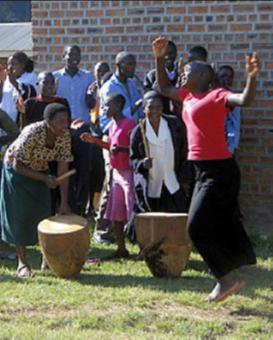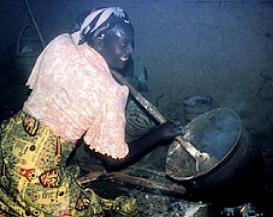THE KINGDON OF HEAVEN
Curious, he pulled aside the vegetation to read a faded inscription, now just a darker staining of mould from that on the rest of the stone, the sea air having corroded away the relief. Ghosts of an inscription: ‘. . . loving memory . . .’ Then below: ‘1898 . . .’, the rest indecipherable. There were more headstones: ‘Beloved mother of . . .’, ‘With Christ, which is far better’, ‘Aged 31’, ‘Loving father’.
My character Michael’s great grandfather waded onto the East African coast in 1890. There were to be thousands more Christian missionaries from Europe landing on Africa’s shores to spread their gospel. Their message fell on fertile ground. The parables of Christ were resonant to the ears of African listeners who were used to an oral literature in which an apparently simple story illustrates an underlying insight or conveys some axiom of belief.
African societies were, and still are, spiritually attuned. Richard Dowden, president of the Royal African Society, has written: Beneath the surface of Africa’s weak nation states lie old cultures, old societies and communities and a deep sense of spiritual power. This is not residual superstition, the vestige of religion. Nor is it a neurosis induced by insecurity or poverty.
Paul Vallely and Bob Geldolf discussed African spirituality on BBC Radio 2 in October 2005 and noted that outsiders are often too dismissive of the local spiritual culture, and so miss out on understanding the people they work amongst. Matthew Parris goes further and suggests that religion is an answer to some of Africa’s problems in his controversial article in the Times titled: As an atheist, I truly believe Africa needs God and subtitled: Missionaries, not aid money, are the solution to Africa's biggest problem.
On the other hand, the American journalist Blaine Harden paints a bleak picture of the use of Christian institutions by some African leaders to legitimise themselves. In his description of an archetypal African President note the telling last sentence: … He bans all political parties except the one he controls. He rigs elections. He emasculates the courts. He cows the press. He stifles academia. He goes to church.
Missionaries frequently appear in fiction as either two-dimension bible-thumpers or as corrupted priests (for example Barbara Kingsolver’s The Poisonwood Bible – which I recommend as one of the great novels of modern times - and Graham Green’s The Power and the Glory). Despite this unflattering characterisation missionaries have been extraordinarily successful, particularly in Africa.
Whilst missionaries may be abhorred and derided by modern Westerners (quite a turnaround from the late 1800s when missionaries such as Livingstone were feted as celebrities), and have made many mistakes, there can be no doubt that the indigenous Christian institutions that they have seeded have generally been a force for good. Dowden in his book Africa, Altered States, Ordinary Miracles, writes: All over Africa the parish today means schools, health clinics, workshops and an indigenous postal service. In most of Africa the Churches have delivered more real development to people than all the governments, the World Bank and aid agencies combined. Africa’s networks of priests, nuns and Church workers are one of Africa’s more effective organizations. When states like Congo, Ghana, Angola, Mozambique and Uganda itself collapsed, the self-sufficient parishes used their moral authority to provide protection. Like the monasteries in Europe during the Dark Ages, they kept civilization going.
Zachye, Stanley and Michael come from cultures considered archaic in much of the modern Western world. Both worlds hold the metaphysical as paramount. In the novel I wanted to portray the missionaries’ world in a non-stereotypical way and from a child’s perspective; with a young child’s acceptance of that world. Writers should be able to take the reader into a world that they are unfamiliar with, or find themselves in disagreement with, in such a way that they can see its internal logic and feel some empathy for the character’s outlook. Everyone acts from a viewpoint that is valid and meaningful from their own perspective.
Michael, the son of missionaries, has a story of buried grief, loss of faith and disconnection from his forebears. He has suffered a dislocation as severe as the herd boy Zachye, but for different reasons. Like Zachye this has a profound effect on Michael’s ability to form lasting relationships. The story explores what it might take to re-find something from his past and what that might be.




